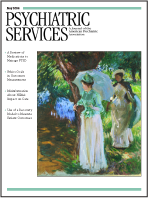An Exploratory Analysis of Correlates of Recovery
Abstract
OBJECTIVE: The concept of recovery has received increasing emphasis in the delivery of services to persons with schizophrenia. This study was an initial effort to develop an empirically based model of factors associated with a recovery orientation. METHODS: The authors reanalyzed data from 825 persons with schizophrenia who were assessed in the Schizophrenia Patient Outcomes Research Team (PORT) client survey. Multiple regression models were used to identify client and service use variables associated with each of four domains identified as important to a recovery orientation: life satisfaction, hope and optimism, knowledge about mental illness and services, and empowerment. RESULTS: In each regression model, the strongest relationship was observed between recovery orientation and lower severity of depressive symptoms. Both receipt of family psychoeducation and fewer side effects of medications were significantly and positively related to three of the four recovery domains. Psychotic symptoms were associated with less life satisfaction. Receipt of various services, including day treatment and legal services, was positively associated with knowledge about illness and services. CONCLUSIONS: Severity of psychiatric symptoms, a core feature of the biomedical perspective of mental illness, was negatively associated with a recovery orientation, and use of a variety of standard services were positively associated with a recovery orientation. Thus a polarized view of biomedical and recovery perspectives on mental illness may be unfounded, given that these perspectives appear to be mutually reinforcing.




